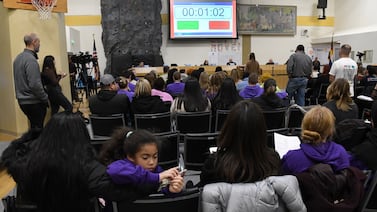Sign up for Chalkbeat New York’s free daily newsletter to get essential news about NYC’s public schools delivered to your inbox.
Omena El signed up for the New York City Teaching Fellows program in search of a more stable career.
El previously cobbled together work as a substitute teacher, nutritionist, and massage therapist, though making ends meet was a struggle. She was thrilled when she was accepted to the city’s Teaching Fellows program, which quickly trains career changers and recent college graduates to fill hard-to-staff positions in the city’s public schools. She looked forward to building a career in the public school system that educated her.
But as the seven-week training program winds down this week, El and many other teaching fellows have yet to receive promised stipends of up to $4,500 to cover summer living costs, according to interviews with five fellows and a site supervisor.
“I’m not able to pay that bus fare” to get to the program, El said. “I’ve been eating the same frozen dinners for lunch every day.” She added: “I love this work, but I didn’t sign up to be exploited, and I didn’t sign up to work for free.”
Teaching fellows across the city said they have struggled to pay their bills even as they worked long hours learning how to manage classrooms, devising lessons, and honing their craft with summer school students. The Education Department has sent vague messages in response to fellows’ concerns about the payment delays. A spokesperson told Chalkbeat in a statement fellows will receive their stipends within the next two weeks.
The payment issues come as the Education Department is trying to ramp up hiring to comply with a state class size mandate that will require recruiting thousands more teachers than usual every year. The Education Department hopes the Teaching Fellows will be one pillar of that strategy. There are nearly 1,000 fellows this year, roughly double the number last year, officials said.
About 12% of the city’s current educators came through the Teaching Fellows program, which launched in 2000 as a fast-track process to the classroom that skirts the traditional certification process. It is also designed to attract more teachers of color to enter the profession.
But payment delays could complicate those efforts by making it harder to recruit future fellows or saddling new educators with unexpected debt.
“This makes me not want to be a teacher,” said one teaching fellow who previously worked in publishing and spoke on condition of anonymity for fear of retaliation. “If anyone asks me to apply for this program, I’m going to tell them ‘no.’”
The teacher-in-training said he expected to be paid in installments beginning early in the summer based on an information session he watched. During that webinar, a Teaching Fellows staff member said “our stipend is distributed from June and it is divided equally,” according to a recording obtained by Chalkbeat.
The fellow was depending on regular payments to replace some of his publishing salary. Instead, he has relied on loans from friends to pay rent.
“It’s placed incredible strain on my relationships,” the fellow said. He recently restarted medication to handle depression and anxiety that have “skyrocketed” as a result.
Education Department spokesperson Chyann Tull did not respond to questions about what caused the payment delays. But an internal message to some fellows blamed bureaucratic snafus.
“Unfortunately this year’s Fellows cohort was caught in the middle of a transition to a new payment structure that was required for us to remain in compliance with tax regulations,” according to an unsigned email sent to some fellows on Friday.
“While the Office of Teacher Recruitment and Quality has been working tirelessly to issue this payment as soon as possible, we deeply apologize for the delay caused by this transition and appreciate your patience and understanding,” the email continued.
The message noted that some fellows should pay attention to their mail after Aug. 1, as the payment will come as a paper check and may take months to replace if lost.
Some observers worried that the payment issues could make it more likely that this crop of Teaching Fellows could leave the classroom more quickly.
“If I’m starting my teaching career in debt, the likelihood that I’ll stay in the teaching profession shrinks,” said Jonathan Collins, a professor of political science and education at Columbia University Teachers College. “As teachers, they’re not on a trajectory to earn a king’s ransom.”
In the context of the looming class size mandate, Collins added, “any small stepback in terms of getting more teachers, or teachers’ aides, into the classroom, is a big deal.”
Another fellow, who is biracial and previously worked as an accountant, said he applied for the program in part because he thinks the teaching force should be more racially diverse. Research suggests students of color have better outcomes when they learn from teachers who look like them.
“I really wanted to be part of the diversity,” said the fellow, who is planning to become a special education teacher and spoke on condition of anonymity. He wound up borrowing $6,500 from relatives to afford rent and groceries this summer, an experience that made him second guess his decision to work for the city’s public school system.
“It is putting people at a disadvantage,” he said. The payment issues “made it feel as if it’s not worth it.”
Alex Zimmerman is a reporter for Chalkbeat New York, covering NYC public schools. Contact Alex atazimmerman@chalkbeat.org.






